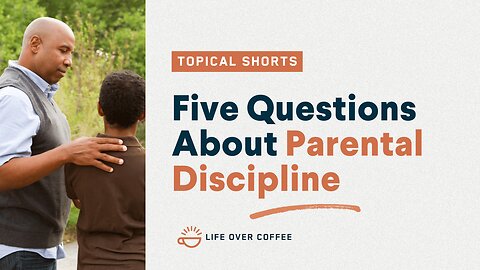
-
How to Address a Lack of Faith Regarding Coronavirus
 Life Over CoffeeMy friend sent a note to me, saying they are afraid of dying as they think about the Coronavirus. They conclude that it reveals a lack of faith. I responded by saying that framing it as a “lack of faith” is not the best way to think about the struggle. I will address this supposed lack of faith, fear of death, and a better way to think about it in this daily brief. I hope that it will serve you as you care for those you love. Life Over Coffee exists to bring hope and help for you and others by creating resources that spark conversations for transformation. Helpful Links Would you please help keep our resources free by donating here: http://bit.ly/2ggwJTF. Learn more about our training here: http://bit.ly/2u2oD25 If you would like to talk to us, go here: http://bit.ly/2ieukJz Video produced by H.M.G.T.: https://bit.ly/2y9szpo Connect with Us: Website: https://bit.ly/3yNZc76 Facebook: https://bit.ly/3wGkWQp Rumble: https://bit.ly/3CotmPt Twitter: https://bit.ly/2SF1BQE Instagram: http://bit.ly/2He98il TikTok: https://bit.ly/3i1moZI YouTube: https://bit.ly/3i0UmND Assessing yourself as having a lack of faith is hard to measure. It is subjective, at best. Perhaps there is another way to discern what could be happening inside of you. In this brief, I’m going to frame the discussion within our current crisis with COVID-19. The virus has brought “pandemic concern” and worry for millions of people. It is the “heat” (external) that is revealing where we are with the Lord (internal). For some, they are thinking about the possibility of death, and they fear it. They don’t want to die. We all agree that reasonable people do not want to die unless they are advanced in years and are indeed at the end of their days, and their health is gone. A person like this may be ready to die. When my 98-year-old grandmother was at this point in her life, she had prepared her heart to go. She was in a nursing home, receiving 24/7 care, and was waiting for death. That scenario makes sense. There are other examples of folks in severe health conditions where death seems to be a better option for them. But a young (or healthy) person is different. If you’re in this category and fear death, is it a lack of faith? I would recommend that you not frame it that way. There are other factors that you can address. Let me list a few of them for you: fear, uncertainty, worry, not taking thoughts captive, love for family, desire to serve the Lord more. All of these things can hinder your faith, without question. But rather than trying to figure out if you don’t have enough faith, pinpoint these more “hands-on” possibilities. Your faith could be vibrant, but now you’re in a season of reflection, and it feels like a lack of faith when, maybe, you’re prone to worry, which is a temptation for you. My friend is thinking about all the people in other countries who died for their faith. My friend believes they can’t do that, which is why they believe there is a lack of faith issues. Do you see what they did? They are making an “argument from silence” because they are not in that type of situation where someone is standing over them, asking them to deny their faith or die. My friend’s situation and an objective life-threatening situation are two different things. There is a difference between someone standing over you and threatening your life and a subjective possibility of dying if “such and such” happen, but aren’t happening now. You could also say, “I have a lack of faith because people die in automobiles, and I may too.” Yes, you could die in a car if you drive recklessly. And you could die from a disease if you live without caution. Those outcomes are possible, but the question remains: is it best to address it from the lack of faith angle or something else that you can change? What you don’t want to do is create “potential worry” or “future worry,” and then bring it into your current situation. If you do that, you could conclude that you don’t have enough faith for something that is not happening to you right now. Jesus talked about this kind of thinking in Matthew 6:34: “Therefore do not be anxious about tomorrow, for tomorrow will be anxious for itself. Sufficient for the day is its own trouble.” Anyone can create future possibilities or potential scenarios, and bring them into where they are today and struggle with their faith. Let me give you an example. A young, unmarried teenager says she is afraid of having a baby because of all the pain. She concludes that she does not have enough faith. Do you see what she did? Would the best approach be to address her “lack of faith,” or could you help her another way? It would be better to discuss things that she could tackle. For example, there is a lack of wisdom in that statement. There is also worry, anxiety, inability to take thoughts captive, not understanding grace when you need it, and God’s sovereign care of our lives. These things that she is struggling with would be an excellent discipleship opportunity so you could address these underlying issues.10 views
Life Over CoffeeMy friend sent a note to me, saying they are afraid of dying as they think about the Coronavirus. They conclude that it reveals a lack of faith. I responded by saying that framing it as a “lack of faith” is not the best way to think about the struggle. I will address this supposed lack of faith, fear of death, and a better way to think about it in this daily brief. I hope that it will serve you as you care for those you love. Life Over Coffee exists to bring hope and help for you and others by creating resources that spark conversations for transformation. Helpful Links Would you please help keep our resources free by donating here: http://bit.ly/2ggwJTF. Learn more about our training here: http://bit.ly/2u2oD25 If you would like to talk to us, go here: http://bit.ly/2ieukJz Video produced by H.M.G.T.: https://bit.ly/2y9szpo Connect with Us: Website: https://bit.ly/3yNZc76 Facebook: https://bit.ly/3wGkWQp Rumble: https://bit.ly/3CotmPt Twitter: https://bit.ly/2SF1BQE Instagram: http://bit.ly/2He98il TikTok: https://bit.ly/3i1moZI YouTube: https://bit.ly/3i0UmND Assessing yourself as having a lack of faith is hard to measure. It is subjective, at best. Perhaps there is another way to discern what could be happening inside of you. In this brief, I’m going to frame the discussion within our current crisis with COVID-19. The virus has brought “pandemic concern” and worry for millions of people. It is the “heat” (external) that is revealing where we are with the Lord (internal). For some, they are thinking about the possibility of death, and they fear it. They don’t want to die. We all agree that reasonable people do not want to die unless they are advanced in years and are indeed at the end of their days, and their health is gone. A person like this may be ready to die. When my 98-year-old grandmother was at this point in her life, she had prepared her heart to go. She was in a nursing home, receiving 24/7 care, and was waiting for death. That scenario makes sense. There are other examples of folks in severe health conditions where death seems to be a better option for them. But a young (or healthy) person is different. If you’re in this category and fear death, is it a lack of faith? I would recommend that you not frame it that way. There are other factors that you can address. Let me list a few of them for you: fear, uncertainty, worry, not taking thoughts captive, love for family, desire to serve the Lord more. All of these things can hinder your faith, without question. But rather than trying to figure out if you don’t have enough faith, pinpoint these more “hands-on” possibilities. Your faith could be vibrant, but now you’re in a season of reflection, and it feels like a lack of faith when, maybe, you’re prone to worry, which is a temptation for you. My friend is thinking about all the people in other countries who died for their faith. My friend believes they can’t do that, which is why they believe there is a lack of faith issues. Do you see what they did? They are making an “argument from silence” because they are not in that type of situation where someone is standing over them, asking them to deny their faith or die. My friend’s situation and an objective life-threatening situation are two different things. There is a difference between someone standing over you and threatening your life and a subjective possibility of dying if “such and such” happen, but aren’t happening now. You could also say, “I have a lack of faith because people die in automobiles, and I may too.” Yes, you could die in a car if you drive recklessly. And you could die from a disease if you live without caution. Those outcomes are possible, but the question remains: is it best to address it from the lack of faith angle or something else that you can change? What you don’t want to do is create “potential worry” or “future worry,” and then bring it into your current situation. If you do that, you could conclude that you don’t have enough faith for something that is not happening to you right now. Jesus talked about this kind of thinking in Matthew 6:34: “Therefore do not be anxious about tomorrow, for tomorrow will be anxious for itself. Sufficient for the day is its own trouble.” Anyone can create future possibilities or potential scenarios, and bring them into where they are today and struggle with their faith. Let me give you an example. A young, unmarried teenager says she is afraid of having a baby because of all the pain. She concludes that she does not have enough faith. Do you see what she did? Would the best approach be to address her “lack of faith,” or could you help her another way? It would be better to discuss things that she could tackle. For example, there is a lack of wisdom in that statement. There is also worry, anxiety, inability to take thoughts captive, not understanding grace when you need it, and God’s sovereign care of our lives. These things that she is struggling with would be an excellent discipleship opportunity so you could address these underlying issues.10 views -
Is It a Good Idea to Expect Pastors to Be Biblical Counselors?
 Life Over CoffeeIt is not necessary and, possibly not wise, for a pastor to have the skill to counsel on a formalized level. Pastoring and counseling are two full-time jobs that differ in application and expectation. If he was good at counseling, his caseload would fill up and it would affect his ability to shepherd the whole flock. He should be a good discipler, but it is better to have a full-time individual who can raise up counselors while counseling. Pastors carrying the load of a full-time shepherd, plus taking on the counseling responsibilities are in a tough spot. Life Over Coffee exists to bring hope and help for you and others by creating resources that spark conversations for transformation. Helpful Links Read the article or listen to the podcast: https://bit.ly/39S4yAt Would you please help keep our resources free by donating here: http://bit.ly/2ggwJTF. Learn more about our training here: http://bit.ly/2u2oD25 If you would like to talk to us, go here: http://bit.ly/2ieukJz Video produced by H.M.G.T.: https://bit.ly/2y9szpo Connect with Us: Website: https://bit.ly/3yNZc76 Facebook: https://bit.ly/3wGkWQp Rumble: https://bit.ly/3CotmPt Twitter: https://bit.ly/2SF1BQE Instagram: http://bit.ly/2He98il TikTok: https://bit.ly/3i1moZI YouTube: https://bit.ly/3i0UmND4 views
Life Over CoffeeIt is not necessary and, possibly not wise, for a pastor to have the skill to counsel on a formalized level. Pastoring and counseling are two full-time jobs that differ in application and expectation. If he was good at counseling, his caseload would fill up and it would affect his ability to shepherd the whole flock. He should be a good discipler, but it is better to have a full-time individual who can raise up counselors while counseling. Pastors carrying the load of a full-time shepherd, plus taking on the counseling responsibilities are in a tough spot. Life Over Coffee exists to bring hope and help for you and others by creating resources that spark conversations for transformation. Helpful Links Read the article or listen to the podcast: https://bit.ly/39S4yAt Would you please help keep our resources free by donating here: http://bit.ly/2ggwJTF. Learn more about our training here: http://bit.ly/2u2oD25 If you would like to talk to us, go here: http://bit.ly/2ieukJz Video produced by H.M.G.T.: https://bit.ly/2y9szpo Connect with Us: Website: https://bit.ly/3yNZc76 Facebook: https://bit.ly/3wGkWQp Rumble: https://bit.ly/3CotmPt Twitter: https://bit.ly/2SF1BQE Instagram: http://bit.ly/2He98il TikTok: https://bit.ly/3i1moZI YouTube: https://bit.ly/3i0UmND4 views -
Dealing With Anger While Sheltering In Place
 Life Over CoffeeDuring times of crisis, there are many recurring temptations that spike. Today's Coronavirus crisis is one of those instances. With people sheltering-in-place and limited means to separate from each other, all sorts of temptations can come. Some examples are annoying each other, worries over the future, job losses, and the possibility of getting sick. These conditions become sin's playground. One of our most common temptations during difficult times is anger, which is why knowing how to deal with it is vital. With the majority of the world sheltering-in-place, it's a recipe for frustration, impatience, and harsh words, to name a few of anger's manifestations. In this daily brief, I want to talk about our old nemesis, anger. I Am Better For anger to function, you have to elevate yourself above another person because anger thrives when it's looking down on someone. It's that "I'm right and you're wrong" attitude. The manifestations of this "greater than, better than" posture are many. E.g., there is verbal anger, which is easy to tell because the person is hovering over you, looking down on you while lecturing you about why you're wrong and they're right. But there are also more subtle forms of anger that aren't verbal. It could be secretly judging another person for what they have, how they are, or something they said that you did not like. In this case, the person under judgment may never know you're doing it to them. But you have elevated yourself above them—in your mind, looked down on them, and made an uncharitable judgment about them. Privately and unjustly judging others is a form of anger. Here is an example of how it can happen. You read or watch something on social media, and you judge them uncharitably. Of course, you could respond to them harshly online, or you could gossip about them to a friend. These three reactions, uncharitable judging, harsh commenting, and gossip, are all forms of sinful anger. Grace for the Humble The most significant issue with this interplay between the heart and the behavior is that there is "no grace" for self-righteous people. What I mean by that statement is that righteous individuals don't need grace. Do you remember the kind of folks who needed grace from Jesus? He responded graciously to the sick, broken, needy, and humble. Anger is a heinous sin, no matter how it works out (manifests) in a person's life because of the self-righteousness that feeds it. The solution, of course, is the Spirit penetrating the "self-righteous resistance field." And the elevated person immediately flings themselves on the Lord, pleading for mercy. Self-righteousness dissipates in the humble heart, and the outward behavior of anger flees. If you're struggling with a specific form of sinful anger, will you find help today? If you don't know who to talk to, please come to our free community forums and tells us what's happening: http://bit.ly/2ieukJz. You may also study our resources on anger, which you can find here: http://bit.ly/2ThY4pI. Life Over Coffee exists to bring hope and help for you and others by creating resources that spark conversations for transformation. Helpful Links Would you please help keep our resources free by donating here: http://bit.ly/2ggwJTF. Learn more about our training here: http://bit.ly/2u2oD25 If you would like to talk to us, go here: http://bit.ly/2ieukJz Video produced by H.M.G.T.: https://bit.ly/2y9szpo Connect with Us: Website: https://bit.ly/3yNZc76 Facebook: https://bit.ly/3wGkWQp Rumble: https://bit.ly/3CotmPt Twitter: https://bit.ly/2SF1BQE Instagram: http://bit.ly/2He98il TikTok: https://bit.ly/3i1moZI YouTube: https://bit.ly/3i0UmND24 views
Life Over CoffeeDuring times of crisis, there are many recurring temptations that spike. Today's Coronavirus crisis is one of those instances. With people sheltering-in-place and limited means to separate from each other, all sorts of temptations can come. Some examples are annoying each other, worries over the future, job losses, and the possibility of getting sick. These conditions become sin's playground. One of our most common temptations during difficult times is anger, which is why knowing how to deal with it is vital. With the majority of the world sheltering-in-place, it's a recipe for frustration, impatience, and harsh words, to name a few of anger's manifestations. In this daily brief, I want to talk about our old nemesis, anger. I Am Better For anger to function, you have to elevate yourself above another person because anger thrives when it's looking down on someone. It's that "I'm right and you're wrong" attitude. The manifestations of this "greater than, better than" posture are many. E.g., there is verbal anger, which is easy to tell because the person is hovering over you, looking down on you while lecturing you about why you're wrong and they're right. But there are also more subtle forms of anger that aren't verbal. It could be secretly judging another person for what they have, how they are, or something they said that you did not like. In this case, the person under judgment may never know you're doing it to them. But you have elevated yourself above them—in your mind, looked down on them, and made an uncharitable judgment about them. Privately and unjustly judging others is a form of anger. Here is an example of how it can happen. You read or watch something on social media, and you judge them uncharitably. Of course, you could respond to them harshly online, or you could gossip about them to a friend. These three reactions, uncharitable judging, harsh commenting, and gossip, are all forms of sinful anger. Grace for the Humble The most significant issue with this interplay between the heart and the behavior is that there is "no grace" for self-righteous people. What I mean by that statement is that righteous individuals don't need grace. Do you remember the kind of folks who needed grace from Jesus? He responded graciously to the sick, broken, needy, and humble. Anger is a heinous sin, no matter how it works out (manifests) in a person's life because of the self-righteousness that feeds it. The solution, of course, is the Spirit penetrating the "self-righteous resistance field." And the elevated person immediately flings themselves on the Lord, pleading for mercy. Self-righteousness dissipates in the humble heart, and the outward behavior of anger flees. If you're struggling with a specific form of sinful anger, will you find help today? If you don't know who to talk to, please come to our free community forums and tells us what's happening: http://bit.ly/2ieukJz. You may also study our resources on anger, which you can find here: http://bit.ly/2ThY4pI. Life Over Coffee exists to bring hope and help for you and others by creating resources that spark conversations for transformation. Helpful Links Would you please help keep our resources free by donating here: http://bit.ly/2ggwJTF. Learn more about our training here: http://bit.ly/2u2oD25 If you would like to talk to us, go here: http://bit.ly/2ieukJz Video produced by H.M.G.T.: https://bit.ly/2y9szpo Connect with Us: Website: https://bit.ly/3yNZc76 Facebook: https://bit.ly/3wGkWQp Rumble: https://bit.ly/3CotmPt Twitter: https://bit.ly/2SF1BQE Instagram: http://bit.ly/2He98il TikTok: https://bit.ly/3i1moZI YouTube: https://bit.ly/3i0UmND24 views -
When You Finally Realize That God Is Not an American
 Life Over CoffeeWhat if God is not an American, and His primary concern is not to keep us from having first-world problems? Is it possible that the Lord has other plans than our pursuit of happiness, and that He may not be totally on board with our ambition to have things our way? Sometimes we can fall asleep at the wheel of life, and the Lord brings a correction that reminds us where our focus should be. It is in those moments of challenge that we finally realize that God is not an American. Get the full TRANSCRIPT https://bit.ly/34pjLYC Life Over Coffee exists to bring hope and help for you and others by creating resources that spark conversations for transformation. Helpful Links Read or listen to the full article here: https://bit.ly/34pjLYC Would you please help keep our resources free by donating here: http://bit.ly/2ggwJTF. Learn more about our training here: http://bit.ly/2u2oD25 If you would like to talk to us, go here: http://bit.ly/2ieukJz Video produced by H.M.G.T.: https://bit.ly/2y9szpo Connect with Us: Website: https://bit.ly/3yNZc76 Facebook: https://bit.ly/3wGkWQp Rumble: https://bit.ly/3CotmPt Twitter: https://bit.ly/2SF1BQE Instagram: http://bit.ly/2He98il TikTok: https://bit.ly/3i1moZI YouTube: https://bit.ly/3i0UmND8 views
Life Over CoffeeWhat if God is not an American, and His primary concern is not to keep us from having first-world problems? Is it possible that the Lord has other plans than our pursuit of happiness, and that He may not be totally on board with our ambition to have things our way? Sometimes we can fall asleep at the wheel of life, and the Lord brings a correction that reminds us where our focus should be. It is in those moments of challenge that we finally realize that God is not an American. Get the full TRANSCRIPT https://bit.ly/34pjLYC Life Over Coffee exists to bring hope and help for you and others by creating resources that spark conversations for transformation. Helpful Links Read or listen to the full article here: https://bit.ly/34pjLYC Would you please help keep our resources free by donating here: http://bit.ly/2ggwJTF. Learn more about our training here: http://bit.ly/2u2oD25 If you would like to talk to us, go here: http://bit.ly/2ieukJz Video produced by H.M.G.T.: https://bit.ly/2y9szpo Connect with Us: Website: https://bit.ly/3yNZc76 Facebook: https://bit.ly/3wGkWQp Rumble: https://bit.ly/3CotmPt Twitter: https://bit.ly/2SF1BQE Instagram: http://bit.ly/2He98il TikTok: https://bit.ly/3i1moZI YouTube: https://bit.ly/3i0UmND8 views -
Six Practical Thoughts When Helping Friends and Enemies
 Life Over CoffeeLiving in a relationship with someone requires a practical awareness of how to do it well. Each person is on a private and personal journey that is unlike any other, which means there will be times when helping your friends or enemies will be challenging. Before I get into these six practical thoughts, let me give you three examples of folks who do not know how to live well with others and have relational tension with them. Life Over Coffee exists to bring hope and help for you and others by creating resources that spark conversations for transformation. Helpful Links Read or listen to the full article: https://bit.ly/3bf52Sy Would you please help keep our resources free by donating here: http://bit.ly/2ggwJTF. Learn more about our training here: http://bit.ly/2u2oD25 If you would like to talk to us, go here: http://bit.ly/2ieukJz Video produced by H.M.G.T.: https://bit.ly/2y9szpo Connect with Us: Website: https://bit.ly/3yNZc76 Facebook: https://bit.ly/3wGkWQp Rumble: https://bit.ly/3CotmPt Twitter: https://bit.ly/2SF1BQE Instagram: http://bit.ly/2He98il TikTok: https://bit.ly/3i1moZI YouTube: https://bit.ly/3i0UmND8 views
Life Over CoffeeLiving in a relationship with someone requires a practical awareness of how to do it well. Each person is on a private and personal journey that is unlike any other, which means there will be times when helping your friends or enemies will be challenging. Before I get into these six practical thoughts, let me give you three examples of folks who do not know how to live well with others and have relational tension with them. Life Over Coffee exists to bring hope and help for you and others by creating resources that spark conversations for transformation. Helpful Links Read or listen to the full article: https://bit.ly/3bf52Sy Would you please help keep our resources free by donating here: http://bit.ly/2ggwJTF. Learn more about our training here: http://bit.ly/2u2oD25 If you would like to talk to us, go here: http://bit.ly/2ieukJz Video produced by H.M.G.T.: https://bit.ly/2y9szpo Connect with Us: Website: https://bit.ly/3yNZc76 Facebook: https://bit.ly/3wGkWQp Rumble: https://bit.ly/3CotmPt Twitter: https://bit.ly/2SF1BQE Instagram: http://bit.ly/2He98il TikTok: https://bit.ly/3i1moZI YouTube: https://bit.ly/3i0UmND8 views -
Three Crucial Words to Care for Others Well
 Life Over CoffeeOne-on-one, directive discipleship is not simple or easy, which may explain why folks do not participate in this type of interactive Christianity. Most Christians prefer a passive approach to discipleship, which could include preaching, teaching, Bible studies, and reading a book. Life Over Coffee exists to bring hope and help for you and others by creating resources that spark conversations for transformation. Helpful Links Would you please help keep our resources free by donating here: http://bit.ly/2ggwJTF. Learn more about our training here: http://bit.ly/2u2oD25 If you would like to talk to us, go here: http://bit.ly/2ieukJz Video produced by H.M.G.T.: https://bit.ly/2y9szpo Connect with Us: Website: https://bit.ly/3yNZc76 Facebook: https://bit.ly/3wGkWQp Rumble: https://bit.ly/3CotmPt Twitter: https://bit.ly/2SF1BQE Instagram: http://bit.ly/2He98il TikTok: https://bit.ly/3i1moZI YouTube: https://bit.ly/3i0UmND But when Paul discipled Timothy, it was a different animal, that required gifting and practice. Of course, the "practice part" is a struggle for many. They had rather be good at it without practicing to be good at it. This perspective is not how you become proficient at anything, and you will never be a reliable discipler if you don't spend many hours swimming in those waters. Things We Teach Three of the essential qualities and characteristics of excellent disciple-makers are compassion, competence, and courage. Let's take a look at those vital concepts more closely. 1. Compassion understands that the person you're talking to is no better or worse than you are. Apart from God's intervening grace, we're "totally depraved" and have no advantage over anyone. The ground around the cross is level. A proud (e.g., harsh) or fearful spirit when caring for someone will not go well. 2. Competence comes from your God-given ability, trust in the Spirit's enabling, prayer, and "getting your reps in" (constant practice). Yes, you can sit-in and observe a seasoned discipler, but like playing the piano, you won't learn by watching. You must actively participate in the thing you want to learn. 3. Courage is the grace-empowered favor from the Lord to speak the truth in love. There are times when you have to say firm and challenging things. You don't have to do this all the time, but when it's appropriate, you must be Christlike in this matter, which means you will do the hard thing. Two Out of Three Is Bad As you probably know, two out of three of these qualities can send you to some wrong places, as well as hurt those within your care. 1. Compassion without courage turns to unbiblical mercy. It feels kind initially, but without substantial soul care, it's not. You weep with those who mourn, but you must lead them to a better place, which takes firmness. 2. Competence without compassion turns to harshness. We have too many illustrations of where this has happened. Perhaps you're one of those who was on the receiving in of mean-spirited soul care. 3. Courage without competence or compassion turns into ignorant and uncaring soul care practices. God leads us into the truth with an eye on our frames, knowing that we are weak and vulnerable. You can put any two of these characteristics together and see how things could go badly. All Three Are Good 1. Compassion understands the person but does not "over-empathize" to the point where there is no directive care. 2. Competence perceives the behavior, the heart, the situation, and all the people involved. 3. Courage is a desire to spread God's fame by being biblical strength to the individual. If you want to learn how to counsel according to your capacity, I recommend that you check out our training program. You can do it all online, and we walk with you—as your coaches—throughout the program. Learn More Here: http://bit.ly/2u2oD2526 views
Life Over CoffeeOne-on-one, directive discipleship is not simple or easy, which may explain why folks do not participate in this type of interactive Christianity. Most Christians prefer a passive approach to discipleship, which could include preaching, teaching, Bible studies, and reading a book. Life Over Coffee exists to bring hope and help for you and others by creating resources that spark conversations for transformation. Helpful Links Would you please help keep our resources free by donating here: http://bit.ly/2ggwJTF. Learn more about our training here: http://bit.ly/2u2oD25 If you would like to talk to us, go here: http://bit.ly/2ieukJz Video produced by H.M.G.T.: https://bit.ly/2y9szpo Connect with Us: Website: https://bit.ly/3yNZc76 Facebook: https://bit.ly/3wGkWQp Rumble: https://bit.ly/3CotmPt Twitter: https://bit.ly/2SF1BQE Instagram: http://bit.ly/2He98il TikTok: https://bit.ly/3i1moZI YouTube: https://bit.ly/3i0UmND But when Paul discipled Timothy, it was a different animal, that required gifting and practice. Of course, the "practice part" is a struggle for many. They had rather be good at it without practicing to be good at it. This perspective is not how you become proficient at anything, and you will never be a reliable discipler if you don't spend many hours swimming in those waters. Things We Teach Three of the essential qualities and characteristics of excellent disciple-makers are compassion, competence, and courage. Let's take a look at those vital concepts more closely. 1. Compassion understands that the person you're talking to is no better or worse than you are. Apart from God's intervening grace, we're "totally depraved" and have no advantage over anyone. The ground around the cross is level. A proud (e.g., harsh) or fearful spirit when caring for someone will not go well. 2. Competence comes from your God-given ability, trust in the Spirit's enabling, prayer, and "getting your reps in" (constant practice). Yes, you can sit-in and observe a seasoned discipler, but like playing the piano, you won't learn by watching. You must actively participate in the thing you want to learn. 3. Courage is the grace-empowered favor from the Lord to speak the truth in love. There are times when you have to say firm and challenging things. You don't have to do this all the time, but when it's appropriate, you must be Christlike in this matter, which means you will do the hard thing. Two Out of Three Is Bad As you probably know, two out of three of these qualities can send you to some wrong places, as well as hurt those within your care. 1. Compassion without courage turns to unbiblical mercy. It feels kind initially, but without substantial soul care, it's not. You weep with those who mourn, but you must lead them to a better place, which takes firmness. 2. Competence without compassion turns to harshness. We have too many illustrations of where this has happened. Perhaps you're one of those who was on the receiving in of mean-spirited soul care. 3. Courage without competence or compassion turns into ignorant and uncaring soul care practices. God leads us into the truth with an eye on our frames, knowing that we are weak and vulnerable. You can put any two of these characteristics together and see how things could go badly. All Three Are Good 1. Compassion understands the person but does not "over-empathize" to the point where there is no directive care. 2. Competence perceives the behavior, the heart, the situation, and all the people involved. 3. Courage is a desire to spread God's fame by being biblical strength to the individual. If you want to learn how to counsel according to your capacity, I recommend that you check out our training program. You can do it all online, and we walk with you—as your coaches—throughout the program. Learn More Here: http://bit.ly/2u2oD2526 views -
Seven Ways to Motivate a Person to Change
 Life Over CoffeeThere are several ways to motivate a person to change. Here are a few approaches that come to mind. As you go through this list, examine your heart to see which ones you tend to employ when someone is not changing according to your expectations. Life Over Coffee exists to bring hope and help for you and others by creating resources that spark conversations for transformation. Helpful Links Would you please help keep our resources free by donating here: http://bit.ly/2ggwJTF. Learn more about our training here: http://bit.ly/2u2oD25 If you would like to talk to us, go here: http://bit.ly/2ieukJz Video produced by H.M.G.T.: https://bit.ly/2y9szpo Connect with Us: Website: https://bit.ly/3yNZc76 Facebook: https://bit.ly/3wGkWQp Rumble: https://bit.ly/3CotmPt Twitter: https://bit.ly/2SF1BQE Instagram: http://bit.ly/2He98il TikTok: https://bit.ly/3i1moZI YouTube: https://bit.ly/3i0UmND 1. The Shame Approach: pointing out how dumb that thing was he did. 2. The Guilt Approach: comparing the person’s poor behavior with someone else’s good behavior. 3. The Threat Approach: yelling the consequences of the person’s sin if he continues in it. 4. The Condemnation Approach: putting him down or making fun of him in front of others. 5. The Critical Approach: always pointing out his faults, no matter how small they may be. 6. The Cynical Approach: though he may have done something good, you know his intent was selfish. How did you do? Did you see yourself in any of those approaches? I think it would be good to ask your spouse, your children, or a few close friends how they characterize you when it comes to how you motivate a person to change. There is a better way. Read or listen to the full article here: http://bit.ly/2wldCvv2 views
Life Over CoffeeThere are several ways to motivate a person to change. Here are a few approaches that come to mind. As you go through this list, examine your heart to see which ones you tend to employ when someone is not changing according to your expectations. Life Over Coffee exists to bring hope and help for you and others by creating resources that spark conversations for transformation. Helpful Links Would you please help keep our resources free by donating here: http://bit.ly/2ggwJTF. Learn more about our training here: http://bit.ly/2u2oD25 If you would like to talk to us, go here: http://bit.ly/2ieukJz Video produced by H.M.G.T.: https://bit.ly/2y9szpo Connect with Us: Website: https://bit.ly/3yNZc76 Facebook: https://bit.ly/3wGkWQp Rumble: https://bit.ly/3CotmPt Twitter: https://bit.ly/2SF1BQE Instagram: http://bit.ly/2He98il TikTok: https://bit.ly/3i1moZI YouTube: https://bit.ly/3i0UmND 1. The Shame Approach: pointing out how dumb that thing was he did. 2. The Guilt Approach: comparing the person’s poor behavior with someone else’s good behavior. 3. The Threat Approach: yelling the consequences of the person’s sin if he continues in it. 4. The Condemnation Approach: putting him down or making fun of him in front of others. 5. The Critical Approach: always pointing out his faults, no matter how small they may be. 6. The Cynical Approach: though he may have done something good, you know his intent was selfish. How did you do? Did you see yourself in any of those approaches? I think it would be good to ask your spouse, your children, or a few close friends how they characterize you when it comes to how you motivate a person to change. There is a better way. Read or listen to the full article here: http://bit.ly/2wldCvv2 views -
The Difference Between Classical and Original Thinkers
 Life Over CoffeeThe difference between being book smart and practically smart is that the first is classical intelligence, where you learn stuff from school. The second is a person's unique ability to take classical intelligence and process and communicate it to someone. Rick talks about the urgent need for original thinkers in discipleship situations. The necessity for original thinkers is the difference between pasting verses over problems and skillfully applying the Bible to the uniqueness of the person you're are helping. Life Over Coffee exists to bring hope and help for you and others by creating resources that spark conversations for transformation. Helpful Links Would you please help keep our resources free by donating here: http://bit.ly/2ggwJTF. Learn more about our training here: http://bit.ly/2u2oD25 If you would like to talk to us, go here: http://bit.ly/2ieukJz Video produced by H.M.G.T.: https://bit.ly/2y9szpo Connect with Us: Website: https://bit.ly/3yNZc76 Facebook: https://bit.ly/3wGkWQp Rumble: https://bit.ly/3CotmPt Twitter: https://bit.ly/2SF1BQE Instagram: http://bit.ly/2He98il TikTok: https://bit.ly/3i1moZI YouTube: https://bit.ly/3i0UmND Everyone is both a classical and original thinker, but our abilities in both are different. Some students excel in an academic environment. Other students struggle to make Cs. But a person's ability to be book smart does not mean he also excels in practical wisdom. Some highly intelligent people are weak on common sense. But then you may have a not-so-book-smart-person who oozes with wisdom, which is an original thinker. He has the unique ability to think innovatively. In discipleship, that person is not a parrot who only repeats what he learned in school. He can adapt his library of knowledge (classical intelligence) to the unique person who is sitting in front of him. These folks become excellent disciplers and counselors. You can tell the difference between a person who parrots excellent information and the discipler who can take the same data into their muse chamber, are transformed by it, and then adapt it to the person they are helping. They are not parrots flying inside an echo-chamber, and they do not fly outside biblical norms and expectations. The question is, how do you become an original thinker? Part of the answer is that it's a gift from the Lord. God has given these folks the ability to learn and communicate uniquely. It's their voice. The other part of the answer is praying, asking the Lord to provide you with the courage to be you, the person that He is shaping. This concept is a vital part of our training in our Mastermind Program because we don't want to train up a bunch of parrots who are merely passing their classroom information along to the person in front of them. The process of our training works like this: 1. We want our students to learn sound, classical, biblical information. 2. We want the Lord to transform them by what they learn. 3. We want them to communicate it according to who they are. If a Christian does not have the "gift of original thinking," it would be best that they were not high-end, formalized counselors because they won't be able to think comprehensively about what a person with complicated and intricate problems need.54 views
Life Over CoffeeThe difference between being book smart and practically smart is that the first is classical intelligence, where you learn stuff from school. The second is a person's unique ability to take classical intelligence and process and communicate it to someone. Rick talks about the urgent need for original thinkers in discipleship situations. The necessity for original thinkers is the difference between pasting verses over problems and skillfully applying the Bible to the uniqueness of the person you're are helping. Life Over Coffee exists to bring hope and help for you and others by creating resources that spark conversations for transformation. Helpful Links Would you please help keep our resources free by donating here: http://bit.ly/2ggwJTF. Learn more about our training here: http://bit.ly/2u2oD25 If you would like to talk to us, go here: http://bit.ly/2ieukJz Video produced by H.M.G.T.: https://bit.ly/2y9szpo Connect with Us: Website: https://bit.ly/3yNZc76 Facebook: https://bit.ly/3wGkWQp Rumble: https://bit.ly/3CotmPt Twitter: https://bit.ly/2SF1BQE Instagram: http://bit.ly/2He98il TikTok: https://bit.ly/3i1moZI YouTube: https://bit.ly/3i0UmND Everyone is both a classical and original thinker, but our abilities in both are different. Some students excel in an academic environment. Other students struggle to make Cs. But a person's ability to be book smart does not mean he also excels in practical wisdom. Some highly intelligent people are weak on common sense. But then you may have a not-so-book-smart-person who oozes with wisdom, which is an original thinker. He has the unique ability to think innovatively. In discipleship, that person is not a parrot who only repeats what he learned in school. He can adapt his library of knowledge (classical intelligence) to the unique person who is sitting in front of him. These folks become excellent disciplers and counselors. You can tell the difference between a person who parrots excellent information and the discipler who can take the same data into their muse chamber, are transformed by it, and then adapt it to the person they are helping. They are not parrots flying inside an echo-chamber, and they do not fly outside biblical norms and expectations. The question is, how do you become an original thinker? Part of the answer is that it's a gift from the Lord. God has given these folks the ability to learn and communicate uniquely. It's their voice. The other part of the answer is praying, asking the Lord to provide you with the courage to be you, the person that He is shaping. This concept is a vital part of our training in our Mastermind Program because we don't want to train up a bunch of parrots who are merely passing their classroom information along to the person in front of them. The process of our training works like this: 1. We want our students to learn sound, classical, biblical information. 2. We want the Lord to transform them by what they learn. 3. We want them to communicate it according to who they are. If a Christian does not have the "gift of original thinking," it would be best that they were not high-end, formalized counselors because they won't be able to think comprehensively about what a person with complicated and intricate problems need.54 views -
MINDMAP – The Battle Over Naming Our Problems and Providing Answers
 Life Over CoffeeOur problems are real. Nobody reasonable person would argue this point. There are objective measures and observations that any rational and observant person can make about a person or an issue. The tension comes when you give a person who describes the problem the authority to bring the solution. This process could be a false continuum. Study this mindmap as Rick explains the good and bad of this dilemma. Life Over Coffee exists to bring hope and help for you and others by creating resources that spark conversations for transformation. Helpful Links Would you please help keep our resources free by donating here: http://bit.ly/2ggwJTF. Learn more about our training here: http://bit.ly/2u2oD25 If you would like to talk to us, go here: http://bit.ly/2ieukJz Video produced by H.M.G.T.: https://bit.ly/2y9szpo Connect with Us: Website: https://bit.ly/3yNZc76 Facebook: https://bit.ly/3wGkWQp Rumble: https://bit.ly/3CotmPt Twitter: https://bit.ly/2SF1BQE Instagram: http://bit.ly/2He98il TikTok: https://bit.ly/3i1moZI YouTube: https://bit.ly/3i0UmND MindNode software: https://mindnode.com Find the PNG and PDF here: https://bit.ly/2Vwx3jo2 views
Life Over CoffeeOur problems are real. Nobody reasonable person would argue this point. There are objective measures and observations that any rational and observant person can make about a person or an issue. The tension comes when you give a person who describes the problem the authority to bring the solution. This process could be a false continuum. Study this mindmap as Rick explains the good and bad of this dilemma. Life Over Coffee exists to bring hope and help for you and others by creating resources that spark conversations for transformation. Helpful Links Would you please help keep our resources free by donating here: http://bit.ly/2ggwJTF. Learn more about our training here: http://bit.ly/2u2oD25 If you would like to talk to us, go here: http://bit.ly/2ieukJz Video produced by H.M.G.T.: https://bit.ly/2y9szpo Connect with Us: Website: https://bit.ly/3yNZc76 Facebook: https://bit.ly/3wGkWQp Rumble: https://bit.ly/3CotmPt Twitter: https://bit.ly/2SF1BQE Instagram: http://bit.ly/2He98il TikTok: https://bit.ly/3i1moZI YouTube: https://bit.ly/3i0UmND MindNode software: https://mindnode.com Find the PNG and PDF here: https://bit.ly/2Vwx3jo2 views -
Five Questions About Parental Discipline
 Life Over CoffeeWhen a child sins there must be appropriate discipline. The parent is teaching consequences for actions. The parent lets the child know there is a price to pay for wrongs—the point and purpose of the gospel. We’re seeing the multi-generational effect of parents who did not practice gospel-informed discipline. We have millions of adults who reject consequences and are hostile to common-sense admonitions. Life Over Coffee exists to bring hope and help for you and others by creating resources that spark conversations for transformation. Helpful Links Would you please help keep our resources free by donating here: http://bit.ly/2ggwJTF. Learn more about our training here: http://bit.ly/2u2oD25 If you would like to talk to us, go here: http://bit.ly/2ieukJz Video produced by H.M.G.T.: https://bit.ly/2y9szpo Connect with Us: Website: https://bit.ly/3yNZc76 Facebook: https://bit.ly/3wGkWQp Rumble: https://bit.ly/3CotmPt Twitter: https://bit.ly/2SF1BQE Instagram: http://bit.ly/2He98il TikTok: https://bit.ly/3i1moZI YouTube: https://bit.ly/3i0UmND3 views
Life Over CoffeeWhen a child sins there must be appropriate discipline. The parent is teaching consequences for actions. The parent lets the child know there is a price to pay for wrongs—the point and purpose of the gospel. We’re seeing the multi-generational effect of parents who did not practice gospel-informed discipline. We have millions of adults who reject consequences and are hostile to common-sense admonitions. Life Over Coffee exists to bring hope and help for you and others by creating resources that spark conversations for transformation. Helpful Links Would you please help keep our resources free by donating here: http://bit.ly/2ggwJTF. Learn more about our training here: http://bit.ly/2u2oD25 If you would like to talk to us, go here: http://bit.ly/2ieukJz Video produced by H.M.G.T.: https://bit.ly/2y9szpo Connect with Us: Website: https://bit.ly/3yNZc76 Facebook: https://bit.ly/3wGkWQp Rumble: https://bit.ly/3CotmPt Twitter: https://bit.ly/2SF1BQE Instagram: http://bit.ly/2He98il TikTok: https://bit.ly/3i1moZI YouTube: https://bit.ly/3i0UmND3 views








